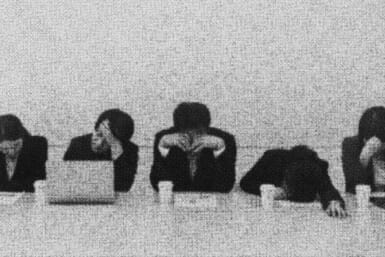Tokyo Weekender’s series TW Creatives feature various works by Japan-based writers, photographers, videographers, illustrators and other creatives in a bid to provide one additional platform for them to exhibit their talent. The works submitted here belong entirely to the creators — Tokyo Weekender only takes pride in being one of their most passionate supporters!
For our latest entry, we present a second short fiction work of author Amanda Huggins.
The Shadow Architect
Satseko flipped open the postbox and retrieved a battered postcard that looked as though it had travelled twice round the world to find her. She picked up her grocery bags and walked over to the lift as she examined the picture. It was a reproduction of an old woodblock print, just like the postcards that her mother, Natsuko, had kept in the drawer of the dining room chest. She turned it over as she stepped into the lift, half-hoping that by some miracle her mother had sent it; that the clock had been turned back nine months and both her parents were still alive.
The card was postmarked Shikoku, and was from Aunt Fumiko.
Don’t worry about me, I’m doing fine. Reluctant to leave the village until the weather improves!
She sighed and pushed it into the top of her bag as she fished for her keys. She had invited her aunt to stay with her in Kyoto at least a dozen times since her parents’ accident. The weather was a poor excuse. It was spring now, and the cherry trees were already bursting with blossom. She had imagined them walking to view the trees by the river, taking food and chilled beer, sitting on the same picnic rug they had used when she was a child. The annual trip to Kyoto had always seemed exciting and exotic to Satseko: the big city shops, the novelty of staying with her grandparents in their traditional old house, and the fragile beauty of the blossom.
When she finished college, Satseko moved to Kyoto for work, but her mother had always worried about her, convinced that cities were dangerous places. She sent her a tiny wooden netsuke figure to which she’d attached homemade paper wings, and told her daughter to look upon it as her guardian angel.
As she opened the apartment door, Akira Okada walked past, hunched inside his coat. He had lived there just a matter of months, but there was a comforting familiarity about him. As usual he didn’t look up, but just waved a hand when she called out a greeting. Despite the fact that he was a man of few words, he would sometimes leave a gift of food outside her door – a bag of tiny cakes, or a jar of pickled plums. He always rang the bell, but by the time she answered he had already walked away, and she would glimpse only his shadow as he turned the corner. Occasionally he would push a postcard underneath the door warning her of a typhoon forecast, or an envelope enclosing a discount coupon for the corner supermarket. Satseko wished she could tell her mother about him; it was almost as though he had been sent as the very guardian angel Natsuko had wanted for her.
She had asked the neighbors about Akira Okada, but no one seemed to know any details, only that he was retired and came from a small village near Kobe. When Satseko mentioned his wife – a woman she only saw fleetingly through the window – her neighbors seemed surprised, as they had heard he was a widower. She was puzzled. The woman definitely existed, but it would appear no one had ever seen her outside the apartment. She considered the possibility that she could be housebound, but this seemed unlikely, because every evening Satseko watched her dance.
The windows of the Okadas’ apartment looked into the well of the building just like hers. They often left the shoji screens half-open after they’d turned on the lamps, and every evening shadows flitted across the paper panels as the couple danced. Satseko occasionally caught glimpses of Mrs. Okada’s yellow ball gown as they stepped out across the floor. Their silhouettes lengthened and shortened as they glided around the room like puppets in an ancient lantern theatre. As they moved close to the window she would see the distorted shadows of their faces on the panels of the screen, heads thrown back, paused as though waiting for applause before commencing the next dance.
As she put away her groceries Satseko glanced across at their apartment, but the room was in darkness.
When she had first seen the Okadas dancing, she had opened her window to try and listen to the music, but they had moved there in the autumn and the windows were usually closed in the evenings. Now it was warmer they were often thrown wide, but she no longer tried to listen, as she had made up her own mind which songs they played, and she sang them to herself as she watched. She imagined them dancing to Frank Sinatra and Dean Martin, just as her parents used to do when she was a child.
Her mother had only ever had one interest: a passion for ballroom dancing. After each class she would teach her father the new steps she had learnt that evening. When she entered the house she would call out to him, breathless, as though she had run all the way home for fear of forgetting the new dance before she had the chance to show him.
‘Kazuo, come quickly, I have some new steps to teach you!’
He would rush through to the hallway to help her out of her coat. The paperwork he’d brought home from the bank would be forgotten, the ledgers left open on his desk, his wire-rimmed reading glasses hurriedly removed.
Satseko would watch quietly in the corner, in awe of her mother as she crossed the room. She appeared elegant and a little distant; no longer her homely mother in a faded linen apron. Her father would stumble and hesitate over the steps at first, but Natsuko was never impatient with him, and he looked into her eyes with devotion as they danced slow-slow-quick-quick-slow across the polished floor. His devotion made Satseko slightly sad, as even when she was a child she could see her mother didn’t feel the same. When she was a teenager Natsuko had told her she’d married Kazuo because she was pregnant: that she’d had no choice. She joked that Satseko was a changeling, resembling neither of them, and then hugged her and laughed when she saw she was upset.
Satseko suddenly realized she was standing stock still, holding a box of rice in her hands as she stared out of the window. She opened the next cupboard and carried on putting her groceries away, turning on the radio to cut through the empty silence.
****
The following morning she called for an ambulance. The Okadas’ rooms had remained in darkness the previous evening, and at first light she woke to hear a faint tapping through the party wall. She pulled on her clothes and rushed round to their door, but there was no answer.
The paramedics rang Satseko’s bell when they arrived and she took them across to the apartment. They hammered on the door, but there was only silence, and eventually they called the building manager for a key. Satseko hesitated on the doorstep, but the two men pushed her gently inside as they headed for the bedroom. She stood immobile just inside the entranceway, surrounded by walls filled with dance photographs, and a high shelf lined with trophies and rosettes.
The medics talked quietly and urgently from inside the bedroom. She heard the clang of apparatus before one of them rushed past her to fetch the stretcher from the corridor.
‘Are they okay?’ she asked.
‘They? There’s only the gentleman – he’s suffered a severe cardiac arrest. Excuse me . . .’
Satseko stepped to one side, and when they walked back through with the laden stretcher she looked away, anxious not to see Akira’s face.
‘But his wife?’ she asked.
They shrugged. ‘There’s no one else here. Will you be locking up?’
She nodded, watched them carry the stretcher awkwardly round the corner to the lift. She looked down at the key in her hand and then pushed the door open again, stepping quietly inside like a thief.
The living room was sparsely furnished and the chairs had been pushed to the edges of the room so that there was space to dance. She walked across to the window and slid back the screens to let in the light. When she turned away she saw a wooden mannequin slumped against the wall in the alcove: a woman in a yellow dress, one arm twisted at an awkward angle behind her, net underskirts spread out in a lake of pale sunshine. Mrs. Okada was merely a life-size puppet, and Akira Okada was nothing more than a shadow architect.
Satseko didn’t question why he would dance with a mannequin. Instead she was consumed by the irrational feeling that she had been cheated and deceived.
She went back into the hall and as she reached for the light switch in the entranceway she noticed that one of the photographs above was entitled ‘Intermediate Class, Onokatsu’. Her heart flipped at the coincidence. She fetched a stool from the kitchen so she could lift it down.
Her mother was on the front row, that unmistakable shy smile lighting up her face, wearing a yellow dress Satseko couldn’t ever remember seeing. Something made her go back into the living room and look closely at a photograph in the alcove. It was Natsuko, wearing the same dress, the mannequin’s dress, dancing with Akira Okada. They were on the dance floor alone, and there was an audience behind them, slightly out of focus. It looked as though they were taking part in a competition or show, but there was something unnervingly intimate about the way they held each other’s gaze. Satseko’s hand shook as she reached out to touch her mother’s cheek. It was incredible and strange to think of her smile lighting up a room in a Kyoto apartment just yards from her own.
She looked more closely at Akira’s face, and suddenly understood why he seemed oddly familiar: he had been Natsuko’s dance teacher. When she was a child he often gave them a lift home if he chanced upon them in the town. She had always been a little scared of him; he had seemed so old and stern to her then. And she also remembered his wife, the librarian; a woman with round spectacles and sad eyes who was often ill.
There was one particular day Satseko had never forgotten: a winter’s afternoon after a trip to the park to build a snownan. Although she’d remembered it often since, she sometimes thought it must have been a dream, as the one time she tried to mention it, Natsuko had immediately silenced her.
It had been almost dusk when they left the park that day, and her mother’s teacher was sat in his car outside the gates. It was as though he’d been waiting for them. They drove home along the coast road, hypnotized by the swirling white flakes against the windscreen. She remembered them whispering urgently to each other, the radio drowning out their words. One of her mother’s favorite songs started playing, and he looked at her and smiled, before turning up the volume. He stopped the car at the edge of a group of trees, and walked round to Natsuko’s door, holding out his hand. Their boots crunched through the snow as they walked to the front of the car, spot-lit in the headlamps. Satseko sat in the back seat, transfixed, watching the snow fall like confetti on her mother’s hair, white against the gleaming black. Their footprints formed patterns as they danced back and forth across the beam of the headlights. As the song ended her mother laid her head against Akira’s shoulder for a moment, and Satseko broke the spell by getting out of the car and running over to join them. They threw their heads back to catch the snowflakes on their tongues, and Natsuko and Akira had laughed and held out their arms. They all linked hands and formed a circle, and as the next song started they were spinning, spinning, spinning . . .
Satseko hung the other photograph back on the wall, then took out her phone to call the hospital. While she waited to be connected to the cardiac unit she caught a glimpse of herself in the hallway mirror.
‘Hello, Miss Satseko Ito? Sorry to have kept you waiting. Are you the next of kin?’
She continued to look at herself in the mirror. She could see it now.
Author’s Profile











